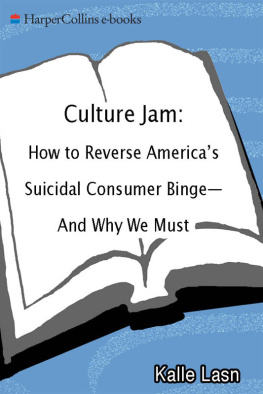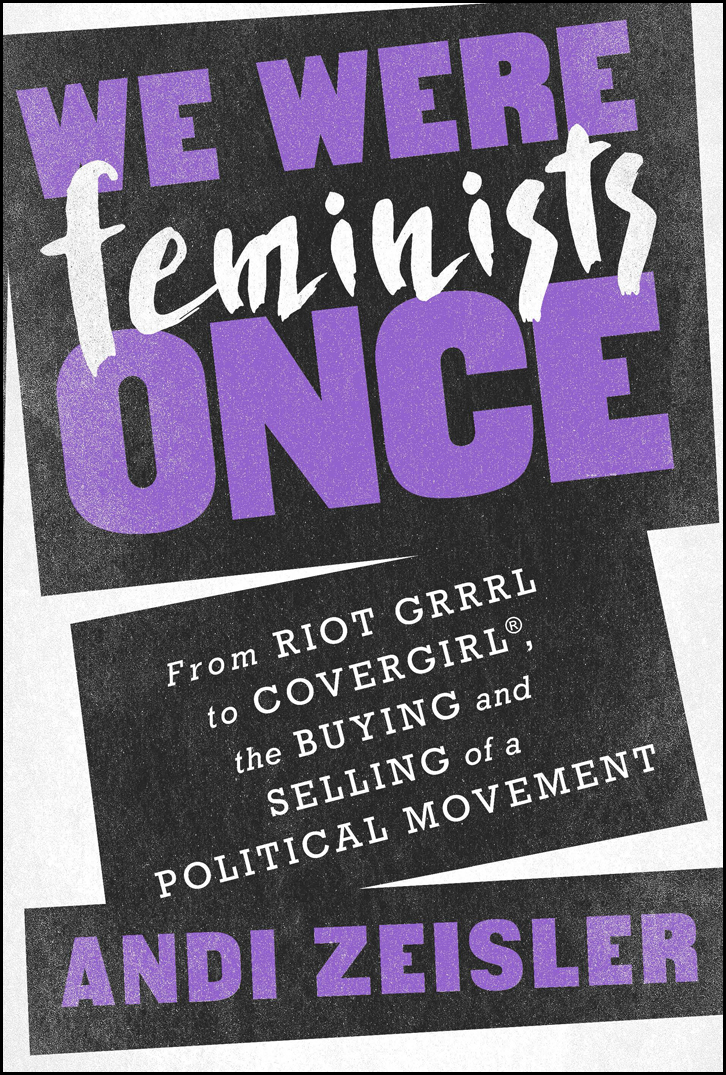
ALSO BY ANDI ZEISLER
Feminism and Pop Culture
BITCHfest: Ten Years of Cultural Criticism
from the Pages of BITCH Magazine (with Lisa Jervis)

Copyright 2016 by Andi Zeisler
Published in the United States by PublicAffairs, a Member of the Perseus Books Group
All rights reserved.
Printed in the United States of America.
No part of this book may be reproduced in any manner whatsoever without written permission except in the case of brief quotations embodied in critical articles and reviews. For information, address PublicAffairs, 250 West 57th Street, 15th Floor, New York, NY 10107.
PublicAffairs books are available at special discounts for bulk purchases in the U.S. by corporations, institutions, and other organizations. For more information, please contact the Special Markets Department at the Perseus Books Group, 2300 Chestnut Street, Suite 200, Philadelphia, PA 19103, call (800) 810-4145, ext. 5000, or e-mail .
Library of Congress Control Number: 2016931950
ISBN 978-1-61039-590-8 (EB)
First Edition
10 9 8 7 6 5 4 3 2 1
To my sweet Harvey
May your generation be the one that
finally figures this shit out.
Table of Contents
Guide
CONTENTS
I didnt set out to write a book about the commodification of feminism, though I guess you could argue that Ive been waiting for it to happen for twenty years.
As one of three founders of the magazine Bitch: Feminist Response to Pop Culture, I always believed that the realm of media and popular culture was where feminism would truly change hearts and minds. At the time we started making our black-and-white, stapled-together zine, it was 1995a time when feminism had only recently reentered the pop-cultural imagination after the massive 1980s backlash that saddled the very word with a wealth of ugly baggage. We were omnivorous pop-culture consumers, and the point of Bitch was to take pop culture seriously as a force that shapes the lives of everyone, and argue for its importance as an arena for feminist activism and analysis. At the dawn of the dot-com revolution, there were no blogs about feminist film criticism, no Twitter feeds that mashed up Judith Butler and the Incredible Hulk. We had only each other as sounding boards for strong opinions and burning questions. Questions like: Why do daytime talk shows treat adolescent female sexuality like an epidemic to be contained? Whats with men in sitcoms and commercials being portrayed as hopelessly bumbling ding-dongs who cant read a grocery list? Why are black people always the first to be killed in disaster movies? And, of course, the eternal query: Why must every female musician who makes the cover of Rolling Stone do so in her underwear?
We called the zine Bitch because we hoped to reclaim the word, and to make its verb form into something that could effect change just by speaking up and encouraging others to do the same. The word we were equally concerned with reclaiming, though, was in the subtitle: A feminist response to pop culture. Born in the 1970s, we came of ideological age during the backlash, seeing and hearing feminism dismissed as, at best, a vexing political incident that had come and gone; or, at worst, a social experiment that had succeeded at the expense of a healthy society and left men hungry for home-cooked meals, children marooned in front of blaring televisions, and women bitter and love-starved. Feminism didnt have an image problem; it had an image catastrophe.
So we launched a zine, and the zine grew into a magazine. At the same time, the word bitch moved deeper into common parlance, becoming a staple of television and radio, a pangender casual greeting, and a signifier of female badassness. But the complexity of making feminist palatable remained.
The belief that there had to be other frustrated feminist pop-culture obsessives out there catalyzed Bitch as an activist project. Our contentessays about television and movies, critiques of ad campaigns, and interviews with feminists of all genders doing cool projectswere things we wanted to read, but had tried and failed to find elsewhere. As time went on, we found that we definitely werent alone: Over the next ten years, pop culture began to be taken seriously. Very seriously. New York Times and Wall Street Journal seriously. Entire-Web-sites-devoted-to-television-recaps seriously. A decade after Bitch launched, we were one of hundreds of Web sites, podcasts, and blogs whose work plumbed the intersections of feminism and popular culture.
As part of a far-flung community of fellow pop-culture feminists that has bloomed over the years, Ive seen pop culture and media transform feminism, for better and for worseand feminism, in turn, change pop culture and media. But as I started to write this book, something weird happened: feminism got cool.
A current of excitement that had previously been humming just under the surface of mainstream culture suddenly amped up. In August 2014, Beyonc commanded the stage at the close of MTVs Video Music Awards, the word FEMINIST glowing in neon lights behind her as her song Flawless sampled the words of Nigerian author Chimimanda Ngozi Adichie. (We teach girls to shrink themselves, to make themselves smaller. We say to girls, You can have ambition, but not too much.) The sample concludes with Adichie paraphrasing the dictionary definition of feminist: The person who believes in the social, political, and economic equality of the sexes. Though the song was already well known, and though Beyoncs particular brand of business-minded feminism was threaded through lyrics dating back to her Destinys Child days, the visual display served as her official flag in the ground. Bathed in spotlights, the biggest pop star in the world rocked the once-maligned label like a curve-hugging Met Gala dress, literally spelling it out for an audience of more than eight million.
Beyonc staking her claim to feminism was the start of a media domino effect. Shortly after, Emma Watson, beloved for years as Harry Potters Hermione, gave a speech on the importance of gender equality to the United Nationsnoting, among other things, that [i]t is time that we all perceive gender on a spectrum, instead of [as] two sets of opposing ideals. The pop singer Taylor Swift, who several years earlier had disavowed feminism, quickly changed tack with a media announcement that, in fact, shed been feminist all along. At Paris Fashion Week, Chanels runway-show finale took the form of a feminist rally, with models draped in the labels signature tweeds raising signs that read History is Her Story and Womens Rights Are More Than Alright. Brands like Verizon, Always, and Pantene began centering feminist themes in their ads for wireless plans, maxi pads, and shine-boosting shampoos. And my Google alert for women and feminism, which used to turn up lonely articles with headlines like Feminism: Outmoded and Unpopular, began teeming with woman-power boosterism: Beyoncs Hip New Club: Feminism, Emma Watson Gives Feminism New Life, Why Male Feminists Are Hot. Seemingly overnight, almost every female celebrityand a fair number of male oneswho walked a red carpet was asked whether they were feminists. References to Lena Dunham and Leaning In were suddenly cropping up in everything from gossip columns to inflight magazines. The increasing presence of transgender women in mainstream pop cultureLaverne Cox, Janet Mock, the Amazon series






